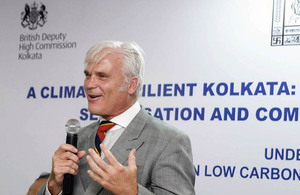UK minister promotes climate action in Kolkata
The UK Minister of State for International Development, Rt. Hon. Desmond Swayne, visited Kolkata on 25 August 2015.

The minister visited the city to see work under the UK-Kolkata Municipal Corporation (KMC) partnership to develop Kolkata into a low-carbon and climate resilient city. The UK government is supporting KMC with a roadmap for sustainable growth in the city.
Along with the West Bengal Environment Minister, Dr Sudarshan Ghosh Dastidar, and the Kolkata Mayor, Sovan Chatterjee, the Minister visited a ward under Borough III and attended a climate change programme for councillors and local community.
Swayne said:
The roadmap for sustainable growth makes Kolkata one of the first Indian mega-cities to have a comprehensive strategy for dealing with the effects of climate change and supporting sustainable urban development. For other cities facing similar challenges this is a model worth replicating and the UK is pleased to be partnering with Kolkata on this exciting project.
Under the roadmap, a project to strengthen capacity of the Government of West Bengal to fully access climate finance will begin shortly.
On this occasion, the visiting minister along with Ghosh Dastidar and Chatterjee launched a graphic booklet in Bengali and Hindi on low carbon and climate resilient Kolkata, a Green Kolkata poster and a ‘Councillors’ Brochure’ on rooftop solar energy. They also distributed prizes to children taking part in a climate change painting competition in the ward.
Speaking on the occasion, Scott Furssedonn-Wood said:
The UK government and the Kolkata Municipal Corporation have been working together to mobilise resources and take effective action for building a climate resilient Kolkata. Local councillors are expected to play one of the most important roles in enabling this transformation. And while doing so, they can create more green jobs for local communities and provide more opportunities of alternative sustainable livelihood for the urban poor.
He also added:
We are initiating a new programme with the Department of Environment, Government of West Bengal for strengthening the capacities of the State Government to help towards the implementation of the State Action Plan on Climate Change. Apart from capacity building, the programme entails the UK government working together with the West Bengal government to identify areas for intervention on climate change, and to conceive and finalise project proposals which can access climate finance.
The partnership will result in tangible benefits to the people of Kolkata. Interventions in solid waste management and reduction in green-house gas emissions will improve the quality of life in a less polluted Kolkata. A city mobility plan, disaster management plan and climate smart wastewater treatment will also improve the ‘liveability’ of the city.
Scaling of solar rooftop and energy efficiency in street lighting will help the urban communities get access to cleaner sources of energy while also reducing electricity bills. Such low-carbon and climate resilient intervention will provide economic opportunities for the people of Kolkata.
Further information:
The British Deputy High Commission Kolkata has been working closely with the Kolkata Municipal Corporation to address climate change impacts through innovative tools and policies. This workshop is one of the 16 borough level workshops being organised to help elected representative of local governments.
Sensitisation Programme: The objective of the workshop is to help elected representatives of local governments play a strategic role in addressing climate change in delivering basic municipal services, by formulating and implementing climate friendly regulations and responding to environmental challenges and climate impacts.
In November 2012, the UK government announced it would end its programme of financial grant aid to India by the end of 2015. The new UK-India development partnership will instead be based on technical assistance programmes, focused on sharing skills and expertise; investments in private sector projects focused on helping the poor; and working in partnership with India on global development issues like food security and climate change.
Follow us on Twitter, Facebook, Instagram, Flickr, Storify, Eventbrite, Blogs, Foursquare, Youtube, Vine, Periscope @UKinIndia, Snapchat @UKinIndia